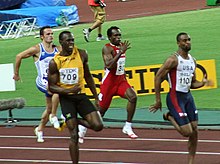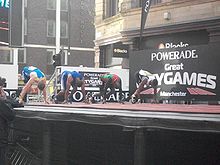Tyson Gay
This made him the second man to win all three events at the same World Championships, after Maurice Greene (Usain Bolt duplicated the feat two years later).
[6][7] Athletic prowess was part of his family life; Gay's grandmother ran for Eastern Kentucky University and his mother Daisy also competed in her youth, though she was pregnant with her first child by her early teens.
[10] Although Gay tended to be a slow starter on the track,[11] he worked hard to improve and broke the Lafayette High School stadium record for the 200 meters.
[9] The move to the college in Great Bend, Kansas, marked further progression for Gay: in 2002 his 100 m and 200 m times dropped to 10.08 s and 20.21 s respectively, albeit with wind assistance.
[21][22] A hamstring injury due to dehydration prevented Gay from competing in the 200 m final, but he did not see the trials as a missed opportunity, rather a springboard for future events: "I was really focused upon the team, had a great shot, but it was a learning experience—how to take care of my body.
Gay formed part of the 4 × 100 m relay team but a poor baton exchange between Mardy Scales and Leonard Scott resulted in disqualification.
[33] It was not only his rival sprinters that would cause future difficulties, however, as Gay's coach Brauman was indicted for various crimes relating to his time at Barton College and the University of Arkansas at Fayetteville.
He became the World Athletics Final champion with another improved personal best of 19.68 s, making him the joint third-fastest 200 m sprinter with Namibian Frankie Fredericks.
[45] At the end of the season, with Gatlin banned from competition, Gay dominated the Track and Field News US 2006 list, having run six of the seven fastest 100 m, with Scott in third, and four of the top six 200 m times (behind Carter and Spearmon).
The Jamaicans set a national record, but it was not enough to beat the United States team, who finished in a world-leading time of 37.78 s. Gay won his third gold medal alongside Darvis Patton, Spearmon and Leroy Dixon.
In November he was chosen as the IAAF Male World Athlete of the Year for 2007 and in his acceptance speech he paid tribute to his peers, encouraging Powell to remain focused and saying that he highly regarded the Jamaican.
He also dismissed comparisons to his forebears, commenting: "I honestly believe that I need to have the World record like some of the other great sprinters like Carl Lewis, Maurice Greene.
[70] Returning to competition in May, he continued as he had left off in 2007: winning the 200 m in Kingston, taking gold in both sprints at the Adidas Track Classic, and finishing second in the 100 m at the Reebok Grand Prix with a 9.85 s run.
[83] Gay made his track return in Beijing but his injury had reduced his 100 m medal chances and Bolt and Powell were more favored to win the event.
"[90] Gay rounded off the season in Europe, winning in the 200 m at Gateshead, but he had to withdraw from a ÅF Golden League race against Bolt and Powell due to his hamstring injury.
After beating Powell for the sixth time in Daegu,[101] Gay stated that he would reconsider his plans for groin surgery in the off-season as it was mainly a case of resolving discomfort when running, rather than a more serious injury.
[104] He suffered from hamstring difficulty after the run but returned to compete at the Prefontaine Classic in Eugene, Oregon, in July – his first meeting of the 2010 IAAF Diamond League.
[105] A week later he attended the British Grand Prix and, in spite of poor conditions, he gained a victory over his rival Asafa Powell with a 9.93-second run.
[108] Gay chose not to overstate the significance of the win, acknowledging that Bolt was far from peak fitness: "It feels great to beat Usain but deep down inside I know he is not 100%.
[109] With Bolt and Powell both out with injuries, Gay won unchallenged at the London Grand Prix the following week, running a world leading time of 9.78 seconds despite poor weather.
[115][116] A nagging hip injury led Gay to withdraw from the 2011 USA Outdoor Track and Field Championships and in July he underwent acetabular labrum surgery; almost a year passed until the next time he competed.
[117][118] Showing readiness for the 2012 Olympic Trials, Gay ran in a low key "B race" at the adidas Grand Prix, running ten seconds flat into a headwind.
[122] Gay was visibly upset about his failure to reach the Olympic podium and cried during the post-race interview, saying, "I felt like I ran with the field and I just came up short".
[123] The 4 × 100 m relay final brought Gay his first Olympic medal and an American-record time of 37.04 seconds alongside Trell Kimmons, Gatlin, and Ryan Bailey.
[125] In the last two Diamond League 100 m races, he ran 9.83 as runner-up at the Athletissima meet, where Yohan Blake equalled Gay's personal best time,[126] and false started at the Weltklasse 100 m series final.
On May 2, 2014, the United States Anti-Doping Agency (USADA) announced that Gay would be suspended until June 23, 2014, and that all his results from July 15, 2012, until his suspension—including his silver medal from the 2012 Summer Olympics—would be stricken.
[134] In September 2016, it was announced that Gay would make a bid to join the U.S. bobsleigh team by competing at the National Push Championships at the Calgary track;[135] however, he withdrew from the competition.
"[12] Gay holds the US record in the 100 m with 9.69 s, making him the joint second fastest sprinter, along with Yohan Blake, in the history of the event after Usain Bolt.
[53][94] In 2010 Gay was a member of the fifth-fastest 4 × 100 m relay team in history, running a 37.45 s with teammates Trell Kimmons, Wallace Spearmon and Michael Rodgers in Weltklasse Zürich 2010.
[142][143] During the Tom Jones Memorial Classic in Gainesville on April 17, 2010, Tyson Gay clocked 44.89 in the 400 m event and became the first man in history to dip under 10.00 in the 100 m, under 20.00 in the 200 m and under 45.00 in the 400 m.[144] *Known as the Continental Cup starting with the 2010 edition.










